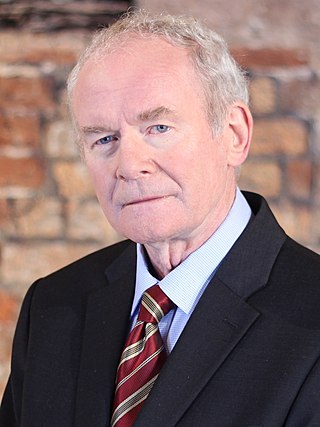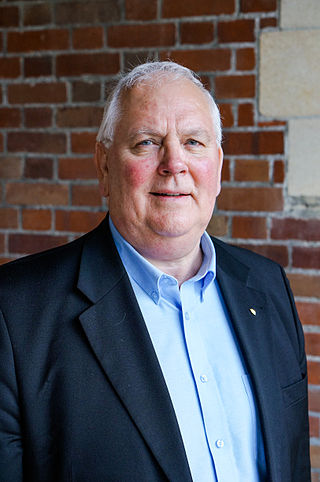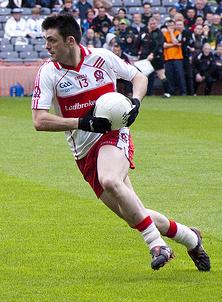Related Research Articles

The Troubles were an ethno-nationalist conflict in Northern Ireland that lasted about 30 years from the late 1960s to 1998. Also known internationally as the Northern Ireland conflict, it is sometimes described as an "irregular war" or "low-level war". The conflict began in the late 1960s and is usually deemed to have ended with the Good Friday Agreement of 1998. Although the Troubles mostly took place in Northern Ireland, at times violence spilled over into parts of the Republic of Ireland, England, and mainland Europe.

The Ulster Volunteer Force (UVF) is an Ulster loyalist paramilitary group. Formed in 1965, it first emerged in 1966. Its first leader was Gusty Spence, a former British Army soldier from Northern Ireland. The group undertook an armed campaign of almost thirty years during The Troubles. It declared a ceasefire in 1994 and officially ended its campaign in 2007, although some of its members have continued to engage in violence and criminal activities. The group is a proscribed organisation and is on the terrorist organisation list of the United Kingdom.

Ian Richard Kyle Paisley, Baron Bannside, was a Northern Irish loyalist politician and Protestant religious leader who served as leader of the Democratic Unionist Party (DUP) from 1971 to 2008 and First Minister of Northern Ireland from 2007 to 2008.

The Ulster Defence Association (UDA) is an Ulster loyalist paramilitary group in Northern Ireland. It was formed in September 1971 as an umbrella group for various loyalist groups and undertook an armed campaign of almost 24 years as one of the participants of the Troubles. Its declared goal was to defend Ulster Protestant loyalist areas and to combat Irish republicanism, particularly the Provisional Irish Republican Army (IRA). In the 1970s, uniformed UDA members openly patrolled these areas armed with batons and held large marches and rallies. Within the UDA was a group tasked with launching paramilitary attacks that used the cover name Ulster Freedom Fighters (UFF) so that the UDA would not be outlawed. The British government proscribed the UFF as a terrorist group in November 1973, but the UDA itself was not proscribed until August 1992.

The Democratic Unionist Party (DUP) is a unionist, loyalist, and national conservative political party in Northern Ireland. It was founded in 1971 during the Troubles by Ian Paisley, who led the party for the next 37 years. Currently led by Jeffrey Donaldson, it is the second largest party in the Northern Ireland Assembly, and is the fifth-largest party in the House of Commons of the United Kingdom. The party has been described as centre-right to right-wing and socially conservative, being anti-abortion and opposing same-sex marriage. The DUP sees itself as defending Britishness and Ulster Protestant culture against Irish nationalism and republicanism. It is also Eurosceptic and supported Brexit.

James Martin Pacelli McGuinness was an Irish republican politician and statesman for Sinn Féin and a leader within the Provisional Irish Republican Army (IRA) during The Troubles. McGuinness was the deputy First Minister of Northern Ireland from May 2007 to January 2017.

Peter David Robinson is a retired Northern Irish politician who served as First Minister of Northern Ireland from 2008 until 2016 and Leader of the Democratic Unionist Party (DUP) from 2008 until 2015. Until his retirement in 2016, Robinson was involved in Northern Irish politics for over 40 years, being a founding member of the DUP along with Ian Paisley.

Maurice Hayes was an Irish public servant and, late in life, an independent member of the 21st and 22nd Seanads. Hayes was nominated by the Taoiseach, Bertie Ahern, in 1997 and re-nominated in 2002. He also served, at the Taoiseach's request, as Chairman of the National Forum on Europe in the Republic of Ireland.

Albert Glenn Barr OBE was a politician from Derry, Northern Ireland, who was an advocate of Ulster nationalism. For a time during the 1970s he straddled both Unionism and Loyalism due to simultaneously holding important positions in the Vanguard Unionist Progressive Party and the Ulster Defence Association.
The Claudy bombing occurred on 31 July 1972, when three car bombs exploded mid-morning, two on Main Street and one on Church Street in Claudy in County Londonderry, Northern Ireland. The attack killed nine civilians, injured thirty and became known as "Bloody Monday". Those who planted the bombs had attempted to send a warning before the explosions took place. The warning was delayed, however, because the telephones were out of order due to an earlier bomb attack. The Provisional Irish Republican Army (IRA) issued an immediate denial of responsibility, and later stated that "an internal court of inquiry" had found that its local unit did not carry out the attack. On the thirtieth anniversary of the bombing, there was a review of the case and in December 2002 it was revealed that the IRA had been responsible for the bomb explosions.

Denis Martin Donaldson was a volunteer in the Provisional Irish Republican Army (IRA) and a member of Sinn Féin who was killed following his exposure in December 2005 as an informer in the employ of MI5 and the Special Branch of the Police Service of Northern Ireland. It was initially believed that the Provisional IRA were responsible for his killing although the Real IRA claimed responsibility for his murder almost three years later. His friendship with French writer and journalist Sorj Chalandon inspired two novels: My Traitor and Return to Killybegs.

Nuala Patricia O'Loan, Baroness O'Loan, MRIA, known between 2007 and 2009 as Dame Nuala O'Loan, is a noted public figure in Northern Ireland. She was the first Police Ombudsman from 1999 to 2007. In July 2009, it was announced that she was to be appointed to the House of Lords and she was so appointed in September 2009. In December 2010, National University of Ireland, Maynooth appointed her as Chairman of its Governing Authority. She is a columnist with The Irish Catholic.

Eoin Bradley is a Gaelic footballer and association footballer. He plays the former for the Glenullin club and, previously, for the Derry county team. With Glenullin he won a Derry Senior Football Championship and with Derry he won a National League title. He also plays association football as a striker for Glenavon.
Trevor Maxwell Ringland, is a Northern Irish solicitor, former rugby union player and politician. From June 2013 to July 2014, he served as Co-Chairman of the NI Conservatives. After attending Larne Grammar School, he read law at Queen's University Belfast.

The Drumcree conflict or Drumcree standoff is a dispute over yearly parades in the town of Portadown, Northern Ireland. The town is mainly Protestant and hosts numerous Protestant marches each summer, but has a significant Catholic minority. The Orange Order insists that it should be allowed to march its traditional route to and from Drumcree Church on the Sunday before the Twelfth of July. However, most of this route is through the mainly Catholic/Irish nationalist part of town. The residents, who see the march as sectarian, triumphalist and supremacist, have sought to ban it from their area. The Orangemen see this as an attack on their traditions; they had marched the route since 1807, when the area was mostly farmland.
Garbhan Downey is a novelist and editor from Derry, Northern Ireland. He is the former Director of Communications and Marketing for Culture Company 2013, which delivered Derry's City of Culture year.
This is a timeline of actions by the Irish republican paramilitary groups referred to as the Real Irish Republican Army and New Irish Republican Army. The Real IRA was formed in 1997 by disaffected members of the Provisional IRA. Since July 2012, when Republican Action Against Drugs (RAAD) and other small republican groups merged with it, the group has been called the New IRA; although it continues to call itself simply "the Irish Republican Army".

The dissident Irish republican campaign began at the end of the Troubles, a 30-year political conflict in Northern Ireland. Since the Provisional Irish Republican Army called a ceasefire and ended its campaign in 1997, breakaway groups opposed to the ceasefire and to the peace agreements have continued a low-level armed campaign against the security forces in Northern Ireland. The main paramilitaries involved are the Real IRA, Continuity IRA and formerly Óglaigh na hÉireann. They have targeted the Police Service of Northern Ireland (PSNI) and the British Army in gun and bomb attacks as well as with mortars and rockets. They have also carried out bombings that are meant to cause disruption. However, their campaign has not been as intensive as the Provisional IRA's, and political support for groups such as the Real IRA is "tending towards zero".

On 3 December 2012, Belfast City Council voted to limit the days that the Union Flag flies from Belfast City Hall. Since 1906, the flag had been flown every day of the year. This was reduced to 18 specific days a year, the minimum requirement for UK government buildings. The move to limit the number of days was backed by the council's Irish nationalists while the Alliance Party abstained from the vote; it was opposed by the unionist councillors.
A series of riots in loyalist areas of Northern Ireland began in Waterside, Derry, on 30 March 2021. After four nights of rioting in Derry, disturbances spread to south Belfast on 2 April, where a loyalist protest developed into a riot involving iron bars, bricks, masonry and petrol bombs. Following this, civil unrest spread to Newtownabbey on 3 April, where cars were hijacked and burnt, and petrol bombs were also used against police. Carrickfergus in southern County Antrim also saw serious civil unrest on the night of 4 April and morning of 5 April, where loyalists created roadblocks to keep police out of local estates and threw petrol bombs at police vehicles.
References
- ↑ 'Father Bradley' finds himself in former no-go area Sunday Business Post, 11 November 2001 Archived 27 August 2006 at the Wayback Machine
- ↑ Consultative Group on the Past Report BBC News, 23 January 2009
- ↑ NI Troubles legacy to cost £300m BBC News, 28 January 2009
- ↑ Honorary Graduate - Denis Bradley University of Ulster, 6 July 2005 Archived 15 October 2006 at the Wayback Machine
- ↑ Minister Ahern condemns attack on Denis Bradley Department of Foreign Affairs, 21 September 2005 Archived 16 July 2011 at the Wayback Machine
- ↑ Politicians condemn Derry pub assault RTE News, 21 September 2005